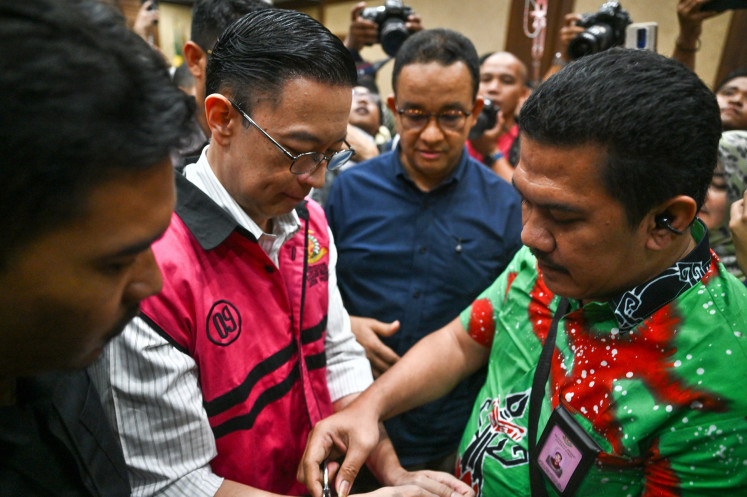Popular Reads
Top Results
Can't find what you're looking for?
View all search resultsPopular Reads
Top Results
Can't find what you're looking for?
View all search resultsPesantren students study english during Ramadhan
The students were conversing loudly in English, with intermittent peals of laughter and rowdiness coming from their classroom
Change text size
Gift Premium Articles
to Anyone
T
he students were conversing loudly in English, with intermittent peals of laughter and rowdiness coming from their classroom. Their joy spread a sense of warmth through the cool village air following tarawih or Ramadhan evening prayers.
The children were santri (students) of Pondok Pesantren Al-Ikhsan, an Islamic boarding school in Beji village in Banyumas, Central Java, and they were practicing their English during the fasting month under the school’s annual intensive Ramadhan English program.
“They practice monologues like making speeches as well as dialogues in front of the class, with some dramatization once in a while to make the sessions more exciting,” said Aniqotul M.Z., a teacher and the school’s English program manager.
The program applies the so-called “Hard Teaching System” (HTS) and is obligatory for all students.
“This school has been positioned as a modern pesantren so that the santri here are required to study English more seriously than it is studied in most schools,” Aniqotul told The Jakarta Post after a recent class.
English is a mandatory subject at the school year-round. “We have around 300 students on average a year. They all have to follow the program and are obliged to speak English in daily conversations,” said Mbak Aniq, as she is commonly called.
Pesantren Al-Ikhsan is managed by K.H. Abu Hamid, a charismatic cleric from Banyumas who founded the school in 1985.
“The English program actually applies on non-Ramadhan days as well but during the fasting month the frequency is quadrupled, with four sessions after three obligatory prayers and tarawih except at dusk,” Aniq said. “It’s called HTS due to the special substance and method involved besides the high intensity.”
While most boarding schools have special Ramadhan programs for the study of religious subjects as contained in the Kitab Kuning (classical religious texts) written in Arabic, Al-Ikhsan focuses on English.
“We study the Kitab Kuning on non-Ramadhan days. So this month we need a challenging subject, which is English,” she said.
According to Aniq, the choice of English for the school’s special Ramadhan program is also based on the fact that santri tend to have better concentration during the fasting month than in other months. “We allow 90 minutes per session with a break after dusk prayers because the time is short and they need some rest after fast-breaking,” she said.
The HTS program consists of half theory and half speech practice. The speeches include conversations and dramatic dialogues. “To avoid monotony, we write short dramas to be played by many students, which are effective to relieve boredom and make them better understand the lessons given,” Aniq said.
Punishments can be doled out for lack of discipline, absences or failing to complete assignments. “Usually the students in question are told to make speeches or give lectures in English,” she said.
The school is quite popular in Central Java for its strong English program. In provincial English speech competitions between Islamic boarding schools, Al-Ikhsan contestants regularly emerge as champions.
“We want santri to keep abreast of the times and be able to occupy important positions in national life, for which English is among the means required. That’s why we emphasize English,” Aniq said.
Pesantren founder K.H. Abu Hamid, 70, is Aniq’s grandfather. “My grandpa teaches religion from the Kitab Kuning at this school. I’m carrying on my late father’s English program,” she said.
Amin Maskur, 23, a santri from Cilacap regency and a student in Purwokerto, claimed to be very much impressed by the English program at Al-Ikhsan. “Here speaking English is common. It’s unlike my high school time, when English was the most dreaded,” Amin said.
In Amin’s view, the method applied by Al-Ikhsan makes English interesting and entertaining. “Far different from what was taught in high school, English is now very engrossing,” he said.
Muhammad, 20, a santri from Jakarta, agreed. “I used to feel inferior when it came to English in school. But now I’m okay. It’s even very absorbing and a lot of fun,” he said.
After following Al-Ikhsan’s program, Amin Maskur has found it easier and more natural to converse in English. “Here conversations come first, then follows deeper language study,” he said.










